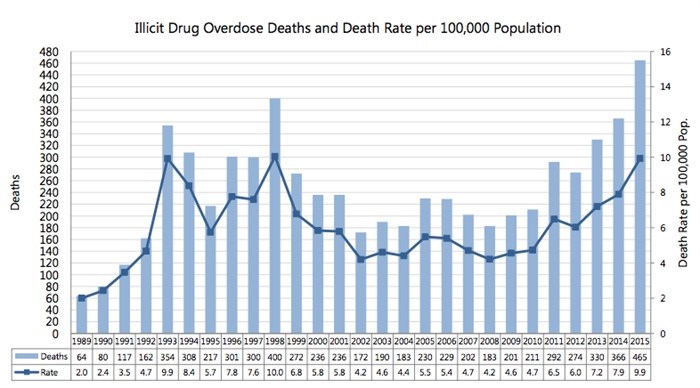
Image Credit: THE CANADIAN PRESS/Graeme Roy
March 25, 2016 - 11:30 AM
THOMPSON-OKANAGAN - With overdose deaths from illicit drugs becoming a more frequent occurrence across Canada, the lack of data on the subject is as equally troubling when it comes to solving the problem, but an Ontario mother and a Waterloo-based group are doing their best to measure the size of the problem before figuring out how to tackle it.
Within 24 hours the City of Kamloops saw seven drug overdoses, one of which was fatal. Other communities in B.C.’s Interior saw a spike of fatal drug overdoses in the last few months which prompted Interior Health Authority to release a warning about a presence of fentanyl making its way through illicit drugs.
But what the authority and the public don’t know is the total number of deaths or the number the near deaths in real time. The information on fatalities isn’t due until the B.C. Coroners Service prepares its next report, which isn’t expected until next year. The only information the public can rely on at this point is anecdotal.
“It’s clumsy and it’s not bulletproof, but it’s certainly better than nothing and nothing is what we’ve got right now,” Michael Parkinson, community engagement coordinator for the Waterloo Region Crime Prevention Council says. “We’re in the midst of the worst drug safety crisis in Canadian history and yet we don’t have a solid handle on how many people are dying, let alone how many people are non-fatally overdosing."
The B.C. Coroners Service recently released its data on illicit drug overdoses from 2015. In the past 25 years, the death toll is at an all-time high. A total 465 people died from a drug overdose last year.

The number of illicit drug overdoses in B.C. over the last 25 years.
Image Credit: B.C. Coroners Service
Parkinson and his coworkers decided since they had no real-time information they would do their best to track what was happening in their area. The process was simple; ask members of the public, community workers, emergency staff and police to fill out a form if they’ve heard of an overdose in the community. The questions are basic: What drug? Where in the city did it happen?
The council calls it the Overdose Monitoring Alert Response (OMAR) system and while it’s the early phases now, Parkinson says it’s helped.
“It’s being run pretty much on volunteer fumes,” Parkinson says. “It’s early days, but we’re getting reports (which go) to a small group of people who then decide if we’re getting duplicate reports or not. And we’ve already issued one alert back at end of January because we had multiple reports coming in. They were heroin-related and people were reporting that the onset of overdose was really fast (which is) reminiscent of very strong fentanyl."
Parkinson doesn’t hide his frustrations with the lack of data. He and other council members have gone to great lengths to point out why tracking overdoses is necessary and prepared a report which highlights tracking systems in Rhode Island, Pennsylvania and Washington states.
“In those jurisdictions a member of the public can look it up online and find out and go from there,” he says. “It’s very close to real time. They used to do it weekly; I think they’ve slowed down a little bit. Those numbers are fluid (because) you’re still waiting for toxicology results."
The Waterloo team isn’t the only group trying to get real-time data recorded across Canada. This week, Ontario mother Christine Padaric launched a Facebook page titled Overdose Canada urging families to post the names, photo and location of those who died from a drug overdose. Inspired by a similar site created in the United States, Padaric ultimately hopes to create an interactive map to raise awareness. She lost her 17-year-old son Austin to a morphine overdose in 2013.
To take a look at the strategic plan and recommendations developed by the Municipal Drug Strategy Co-ordinator’s Network of Ontario which the Waterloo team contributed to, click here.
RELATED READING:
Health officials eye controversial response to overdose deaths: Is the B.C. Interior ready for it?
A Kelowna safe injection site would have its challenges
Tracking drug overdoses needs improvement to curb the 'fentanyl crisis': Kamloops doctor
To contact a reporter for this story, email Glynn Brothen at gbrothen@infonews.ca or call 250-319-7494. To contact the editor, email mjones@infonews.ca or call 250-718-2724.
News from © iNFOnews, 2016